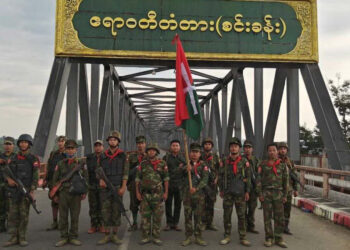The junta and Chinese state-owned firm CITIC signed an addendum to the concession agreement for the Kyaukphyu Special Economic Zone (SEZ) and deep-sea port on Tuesday in Naypyitaw as the two sides seek to expedite construction of the stalled SEZ in western Myanmar’s Rakhine State.
The signing ceremony drew top junta officials and diplomats from the Chinese Embassy, including junta Deputy Prime Minister and Transport Minister Mya Tun Oo and junta Government Office Minister Aung Naing Oo – who chairs the Myanmar SEZ Central Working Committee.
CITIC executives, including its group chair, also attended the ceremony.
The project is being developed by the Kyaukphyu SEZ Deep Seaport Co. Ltd, a joint venture between the CITIC Myanmar Port Investment Limited and the Myanmar government-backed Kyaukphyu SEZ Management Committee.
The addendum was signed by Kyaukphyu SEZ Deep Seaport Co. Ltd director Liang Chuanxin and Kyaukphyu SEZ management committee chair Kyaw Shwe Tun.
Details about the addendum were not made public.
The regime likely made numerous concessions in the addendum to entice the Chinese side to move forward, business analysts said.
The project’s shareholding remains unchanged. CITIC holds a 70 percent stake and the Myanmar side 30 percent, as agreed by the two sides in 2018 after several rounds of negotiations
The Kyaukphyu port and SEZ are key to the 1,700-kilometer China-Myanmar Economic Corridor connecting Kunming in Yunnan province to the Indian Ocean.
The budget for the Kyaukphyu SEZ is US$1.3 billion, while the budget for the port is $7.3 billion. They will span 150 hectares on Maday Island and 96 hectares on Ramree Island in Rakhine’s Kyaukphyu Township.
At a meeting of the Central Committee for Myanmar SEZs in October last year, deputy junta chief Soe Win, who chairs the committee, called for the swiftest possible resumption of the SEZ and port project. At the meeting, he stressed the need to more clearly define the provisions in the concession agreement.
“The addendum was signed for clearer and more accurate understanding of the concession agreement regarding the powers and responsibilities of both sides,” a statement from the junta’s Commerce Ministry said without elaborating.
The signing of the addendum comes as the junta is suffering major losses from an offensive launched by the Brotherhood Alliance along the border with China in northern Shan State. It desperately needs help from China, which has considerable influence over ethnic armed groups near its border.
Border trade with China and investment in BRI projects in Myanmar have been halted by fighting along the border with China in northern Shan State. Although China has twice mediated talks between the regime and the Brotherhood Alliance, fighting continues and the regime has rapidly lost large swaths of territory in northern Shan State in just two months.
The SEZ and deep-sea port are part of the China-Myanmar Economic Corridor, which was designed to provide China with direct access to the Indian Ocean, allowing its oil imports to bypass the Strait of Malacca and spur development in China’s landlocked Yunnan Province.
In 2015 CITC won the tender to build the Kyaukphyu SEZ and a framework agreement was signed in 2018 under the now ousted National League for Democracy government.
Shareholders and concession agreements were signed in 2020, but the project was delayed by the pandemic, Mya Tun Oo said.
Aung Naing Oo and Liang Chuanxin held a press briefing following the signing of addendum.
They said the two sides are working together to start the project promptly. When complete, it will become the trade hub connecting the markets of Asia, Africa and Europe, and spur the socio-economic development of Myanmar and the region, providing a new gateway to the world, they said.
Despite Aung Naing Oo’s claim, local residents were still protesting the project late last year, saying it had damaged their fisheries.
Ongoing fighting in Ramree, which borders Kyaukphyu, makes it difficult for the massive project to proceed, business analysts say.

















